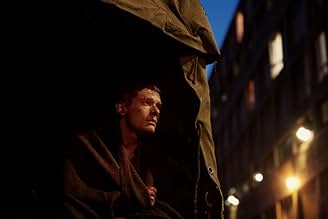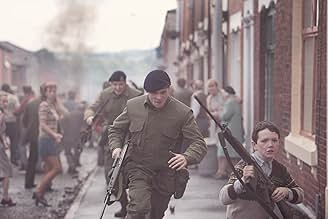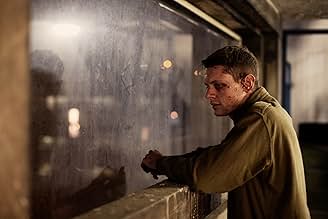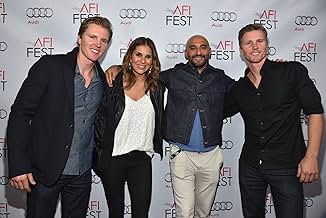En 1971, un jeune soldat britannique perdu les rues meurtrières de Belfast est par erreur abandonné par son unité lors d'une émeute.En 1971, un jeune soldat britannique perdu les rues meurtrières de Belfast est par erreur abandonné par son unité lors d'une émeute.En 1971, un jeune soldat britannique perdu les rues meurtrières de Belfast est par erreur abandonné par son unité lors d'une émeute.
- Réalisation
- Scénario
- Casting principal
- Nomination aux 2 BAFTA Awards
- 14 victoires et 31 nominations au total
Avis à la une
Set against the complex backdrop of the beginnings of Northern Ireland in 71 but before Bloody Sunday really turned the tide in the favour of the IRA in 72 this is an extremely well made taught piece of drama. With an assured performance by rising star Jack O'Connell in the lead, he plays a young soldier Gary Hook recently deployed to Northern Ireland who finds himself out of his dept when going on his first patrol thanks to the incompetence of his CO (Sam Reid) - Separated from his unit and lost in a city he doesn't know he's forced in a fight for survival as its hard to tell who is friend and who is foe in this extremely well written piece of drama. The writer here has taken care not to paint one side entirely good or bad and that is how it was. Wounded and armed with nothing but a knife Hook has enemies closing in from all sides as the film draws to a bloody climax.
I don't want to be accused of gushing praise, but there is much to compliment the whole team involved here, from the tones of the production design, beautifully capturing the mood feel and look of the 1970's in drab pastels and the grey of urban decay. The editing, directing, lighting is all bang on the money but greatest of all is the casting, for it is not only O'Connell who shines here, but the younger members of the cast almost upstage him with their brilliant performances. Two stand outs of the younger cast were Corey McKinley (Listed rather almost like an extra on here as 'Loyalist Child which seems a little unfair) and Barry Keoghan - The former is clearly a star in the making with his ballsy performance while Keoghan with almost no lines makes an amazing impact with simple looks conveying the struggles of emotion he feels inside when it comes to committing to a path of violence. Veterans Sean Harris brings his creepy presence to the duplicitous under cover unit commander but it is an energetic performance by O'Connell that brings it all together. Let us hope we do not loose him to Hollywood entirely. The film also takes time to give Hooks character some context, so we have some idea of his own life and attachments back home. A man almost without a family but not without people who are depending on him, this is a true depicting for many whom join the army, an alternative to spending life on the dole.
This film is living proof that we can make thrilling and exciting cinema in the UK but still leave some room for Social Commentary within the context of a great story - an excellent thriller which hints at the dark path that was to follow in Northern Ireland for many years. Strongly recommended.
I don't want to be accused of gushing praise, but there is much to compliment the whole team involved here, from the tones of the production design, beautifully capturing the mood feel and look of the 1970's in drab pastels and the grey of urban decay. The editing, directing, lighting is all bang on the money but greatest of all is the casting, for it is not only O'Connell who shines here, but the younger members of the cast almost upstage him with their brilliant performances. Two stand outs of the younger cast were Corey McKinley (Listed rather almost like an extra on here as 'Loyalist Child which seems a little unfair) and Barry Keoghan - The former is clearly a star in the making with his ballsy performance while Keoghan with almost no lines makes an amazing impact with simple looks conveying the struggles of emotion he feels inside when it comes to committing to a path of violence. Veterans Sean Harris brings his creepy presence to the duplicitous under cover unit commander but it is an energetic performance by O'Connell that brings it all together. Let us hope we do not loose him to Hollywood entirely. The film also takes time to give Hooks character some context, so we have some idea of his own life and attachments back home. A man almost without a family but not without people who are depending on him, this is a true depicting for many whom join the army, an alternative to spending life on the dole.
This film is living proof that we can make thrilling and exciting cinema in the UK but still leave some room for Social Commentary within the context of a great story - an excellent thriller which hints at the dark path that was to follow in Northern Ireland for many years. Strongly recommended.
Understanding the intricacies of the Troubles is by no means an easy task, but director Yann Demange has done an excellent job of presenting this conflict in '71. Demange made something of a name for himself on British television, directing the E4 horror series Dead Set and Channel 4 crime drama Top Boy, and this success has translated very well into a film with much larger political significance.
The characters of '71 are very much forged by their on-screen experience. Little backstory is given to the protagonist, Gary Hook, portrayed by Jack O'Connell, yet he gives a compelling physical and visual performance with an almost empty script. The intimate, personal atmosphere of the film makes the political conflict much easier to grasp for the viewer and the diversity of the opposing factions and characters shines through with an excellent supporting cast.
The only flaw I could find in the film is its difficulty in exploring the "why" behind the conflict we witness on our screens. This in itself may play into the story, however, as British soldiers expecting to be sent abroad found themselves much closer to home, in a conflict they themselves didn't fully understand.
The Troubles are a criminally under-taught and under-represented period so '71 offers an intriguing glimpse into the unrest and disorder that regrettably continues to this day.
The characters of '71 are very much forged by their on-screen experience. Little backstory is given to the protagonist, Gary Hook, portrayed by Jack O'Connell, yet he gives a compelling physical and visual performance with an almost empty script. The intimate, personal atmosphere of the film makes the political conflict much easier to grasp for the viewer and the diversity of the opposing factions and characters shines through with an excellent supporting cast.
The only flaw I could find in the film is its difficulty in exploring the "why" behind the conflict we witness on our screens. This in itself may play into the story, however, as British soldiers expecting to be sent abroad found themselves much closer to home, in a conflict they themselves didn't fully understand.
The Troubles are a criminally under-taught and under-represented period so '71 offers an intriguing glimpse into the unrest and disorder that regrettably continues to this day.
War tends to find its way in movies the way a car chase, love triangle or training sequence does, as a backdrop for profound introspection (Apocalypse Now) or profound absurdity (Battleship). '71, directed by Yann Demange, which screened at the New York Film Festival, does not concern itself with the impossibility of unraveling the politics behind violence, or implant an over-the- top action sequence, but uses the Northern Ireland conflict of the late 60's and early 70's as context, not base.
The Catholic/ Protestant, or even English/ Irish conflict is not covered in great detail which allows the film to construct its own sensibility: a netherworld where an English soldier sent to Belfast, Gary Hook (Jack O'Connell), must find trust and a way back. Houses are not homes, but bunkers for families supposedly hiding guns and trying to raise children. Bombs are the weapons of choice and children are the only ones with answers, creating a sci-fi texture to the film. This is a thriller and the plot is something you can find out about when you actually see the movie.
War, conflict (whatever you want to call killing a bunch of people) is an abyss not just of death, but of trust—who values my life? No one. Yet Demange does not attempt to make an affected statement about war, and focuses on the grey of the conflict with Gary as his sharp, contrasting center. As Gary slowly emerges through the desolate streets of Belfast he is greeted by a boy (Corey McKinley) who seems to be his only salvation. The boy struts, demanding respect as he cusses out his fellow "comrades" in a scene that could be strait out of Blade Runner.
During the Q&A after the film Demange recalled not wanting McKinley to rehearse too much, he didn't want an actor, but a real boy who in such a setting needs an armor of bravado to stay alive. McKinley, who Demange found at a boxing ring (he's 9), preferred boxing to rehearsing in between scenes, and it paid off. Besides O'Connell McKinley is the most memorable actor in the film. O'Connell, who made a mark with This is England and the series Skins, recently burst into films consciousness with the prison drama Starred Up, and is about to find himself in epic American waters with Angelina Jolie's directorial debut Unbroken. At only twenty-four years of age O'Connell has managed to create a provoking and mature persona. With a gruff low voice and edgy exterior, O'Connell brings a swagger which is unparalleled as almost every scene belongs to him and the film works because of him.
I am a bit afraid after his American debut, O'Connell will somehow loose his edge, but he comes across as smarted than the Hollywood unconsciousness. He has a lot to give us and this is only the beginning, handle with care (300: Rise of an Empire, yeah he's in that). Although thrillers tend not to be my cup of tea, I like developed characters and layers of plot—'71 takes place in the span of 24 hours—it is still an exceptional piece mainly due to O'Connell's masterful performance, Demange's restrained direction and Tat Radcliffe's stylized cinematography.
'71 is still making the festival rounds and does not yet have a U.S. release date, but will be released in the U.K. on October 10th.
@MeMontgom filmnoises.com
The Catholic/ Protestant, or even English/ Irish conflict is not covered in great detail which allows the film to construct its own sensibility: a netherworld where an English soldier sent to Belfast, Gary Hook (Jack O'Connell), must find trust and a way back. Houses are not homes, but bunkers for families supposedly hiding guns and trying to raise children. Bombs are the weapons of choice and children are the only ones with answers, creating a sci-fi texture to the film. This is a thriller and the plot is something you can find out about when you actually see the movie.
War, conflict (whatever you want to call killing a bunch of people) is an abyss not just of death, but of trust—who values my life? No one. Yet Demange does not attempt to make an affected statement about war, and focuses on the grey of the conflict with Gary as his sharp, contrasting center. As Gary slowly emerges through the desolate streets of Belfast he is greeted by a boy (Corey McKinley) who seems to be his only salvation. The boy struts, demanding respect as he cusses out his fellow "comrades" in a scene that could be strait out of Blade Runner.
During the Q&A after the film Demange recalled not wanting McKinley to rehearse too much, he didn't want an actor, but a real boy who in such a setting needs an armor of bravado to stay alive. McKinley, who Demange found at a boxing ring (he's 9), preferred boxing to rehearsing in between scenes, and it paid off. Besides O'Connell McKinley is the most memorable actor in the film. O'Connell, who made a mark with This is England and the series Skins, recently burst into films consciousness with the prison drama Starred Up, and is about to find himself in epic American waters with Angelina Jolie's directorial debut Unbroken. At only twenty-four years of age O'Connell has managed to create a provoking and mature persona. With a gruff low voice and edgy exterior, O'Connell brings a swagger which is unparalleled as almost every scene belongs to him and the film works because of him.
I am a bit afraid after his American debut, O'Connell will somehow loose his edge, but he comes across as smarted than the Hollywood unconsciousness. He has a lot to give us and this is only the beginning, handle with care (300: Rise of an Empire, yeah he's in that). Although thrillers tend not to be my cup of tea, I like developed characters and layers of plot—'71 takes place in the span of 24 hours—it is still an exceptional piece mainly due to O'Connell's masterful performance, Demange's restrained direction and Tat Radcliffe's stylized cinematography.
'71 is still making the festival rounds and does not yet have a U.S. release date, but will be released in the U.K. on October 10th.
@MeMontgom filmnoises.com
I tend to avoid most celluloid representations of Northern Irish Troubles - the longest running terrorist campaign in Europe, costing approximately 3000 lives and hundreds of millions of pounds in property damage and displacement - as oversimplified, glossy and biast; The Devil's Own, The Jackal, The Sons of Anarchy (particularly the last) portray Belfast either as some kind of South Central Los Angeles, or a gaudy Roger and Hammerstein set, with preconceived
notions of The Troubles, and frankly unrealistically romantic portrayals of (usually Republican) paramilitaries.
'71 offers a gritty change of direction and pace. Told from the bewildered (and bewildering) viewpoint of one Gary Hook (an excellent portrayal by Jack O'Connell), a young British Army private marooned in Belfast - he's still in the UK his mates are assured! - after a supposedly straightforward raid goes drastically wrong; we're sucked nto a grimy, claustrophobic race for survival; Gary's race is our race. Hotly pursued by a Provo hit squad, Gary soon learns shocking lessons about trust...
Perhaps the thriller element does get somewhat overdone - not as much as Fifty Dead Men Walking, mark - but I was genuinely impressed at the attempt made to grasp the nettle of the turmoil in the early Seventies and break it down for the outsider; how often has the Official v Provisional split been discussed or portrayed in film? The Loyalists are mostly comic relief, but an attempt is made to portray them as real people...just like the ordinary Catholics who risk their lives to aid the stiken Gary.
Sean Harris deserves a mention as the devious Military Reaction Force officer (a real undercover outfit) running numerous Protestant and Catholic players; and contrary to some reviewers, barricades and vigilante patrols were fairly common during the early part of the decade - did he never hear of Free Derry?
This is an honest attempt to unravel the confusion of Ulster's tragedy for the perspective of a confused outsider, particularly a lone British soldier; it deserves praise for its insight and bravery.
'71 offers a gritty change of direction and pace. Told from the bewildered (and bewildering) viewpoint of one Gary Hook (an excellent portrayal by Jack O'Connell), a young British Army private marooned in Belfast - he's still in the UK his mates are assured! - after a supposedly straightforward raid goes drastically wrong; we're sucked nto a grimy, claustrophobic race for survival; Gary's race is our race. Hotly pursued by a Provo hit squad, Gary soon learns shocking lessons about trust...
Perhaps the thriller element does get somewhat overdone - not as much as Fifty Dead Men Walking, mark - but I was genuinely impressed at the attempt made to grasp the nettle of the turmoil in the early Seventies and break it down for the outsider; how often has the Official v Provisional split been discussed or portrayed in film? The Loyalists are mostly comic relief, but an attempt is made to portray them as real people...just like the ordinary Catholics who risk their lives to aid the stiken Gary.
Sean Harris deserves a mention as the devious Military Reaction Force officer (a real undercover outfit) running numerous Protestant and Catholic players; and contrary to some reviewers, barricades and vigilante patrols were fairly common during the early part of the decade - did he never hear of Free Derry?
This is an honest attempt to unravel the confusion of Ulster's tragedy for the perspective of a confused outsider, particularly a lone British soldier; it deserves praise for its insight and bravery.
I will be honest and say that I generally am touchy about films using the sectarian terrorist organizations, the troubles, or other aspects of Northern Irish politics as a base for thrillers or films – mainly because when they do, they do so in a rather heavy-handed and thoughtless way such as The Devil's Own, The Jackal, or many other such films. So with '71 there is a certain odd feeling that uses the streets of Belfast in the early 1970's as a launching point for a thriller involving British soldiers, terrorists on both sides of the divide, the RUC, and civilians of the time. This is not only an odd feeling that I had, but it is also one that the film itself seems to be all too aware of.
To talk generally the film does provide some good tension, with its fast pace, shifting ground, and hand-held camera-work; when it is doing this it is fine – not perfect, but fine. The sense of being trapped between all sides is apparent, and with the stakes high it does move well with what it does. The need to have all the players be clear and be positioned does rather reduce the pace a bit, but what does limit the film a bit is, ultimately, the politics of it. So, for some of this it is not the film that does this but rather the viewer – I guess particularly if you are familiar with the Troubles then it is hard to detach your personal opinions from the drama, which can make some of it harder to get into. The bigger thing though is that the film itself is conscious of this being a real situation, and as such it does know it carries a certain weight with it compared to if it had created this story in a fictional situation.
The cast carry this weight too, although mostly they do play out their characters as a more straightforward thriller – which helps the film be just that. O'Connell, Harris, Dormer, and others all play solid roles in the thriller side, even if the weight of the politics stop them just being genre devices, or being too details as real people. The pacing and structure of the film is good, and mostly it does manage to present the city streets of the Belfast roadblocks and no-go areas as oppressive and ensnaring if you are on the wrong side of them.
So as a thriller it mostly does work well thanks to the shifting narrative, and pace of delivery, however it is a film that senses the weight of the real story that it is using for the purposes of the thriller, and this knowledge does make a difference across the delivery.
To talk generally the film does provide some good tension, with its fast pace, shifting ground, and hand-held camera-work; when it is doing this it is fine – not perfect, but fine. The sense of being trapped between all sides is apparent, and with the stakes high it does move well with what it does. The need to have all the players be clear and be positioned does rather reduce the pace a bit, but what does limit the film a bit is, ultimately, the politics of it. So, for some of this it is not the film that does this but rather the viewer – I guess particularly if you are familiar with the Troubles then it is hard to detach your personal opinions from the drama, which can make some of it harder to get into. The bigger thing though is that the film itself is conscious of this being a real situation, and as such it does know it carries a certain weight with it compared to if it had created this story in a fictional situation.
The cast carry this weight too, although mostly they do play out their characters as a more straightforward thriller – which helps the film be just that. O'Connell, Harris, Dormer, and others all play solid roles in the thriller side, even if the weight of the politics stop them just being genre devices, or being too details as real people. The pacing and structure of the film is good, and mostly it does manage to present the city streets of the Belfast roadblocks and no-go areas as oppressive and ensnaring if you are on the wrong side of them.
So as a thriller it mostly does work well thanks to the shifting narrative, and pace of delivery, however it is a film that senses the weight of the real story that it is using for the purposes of the thriller, and this knowledge does make a difference across the delivery.
Le saviez-vous
- AnecdotesMost scenes were shot in Northern England.
- GaffesIn the initial chase scene where Gary runs from the shooter he is fired at 32 times (including the first kill shot) from what seems like just one man's gun, we don't see the younger boy fire his gun at all. We also don't see any reloading as they are running at breakneck speed. This would be impossible from a small 1960's era 9mm Semi-automatic pistol which have at most 13 rounds in the magazine.
- ConnexionsFeatured in Projector: The Imitation Game/'71 (2014)
- Bandes originalesTHE SKY IS CRYING
Written and Performed by Elmore James
Published by EMI Music Publishing Limited
Courtesy of Sony Music Entertainment Inc
Meilleurs choix
Connectez-vous pour évaluer et suivre la liste de favoris afin de recevoir des recommandations personnalisées
- How long is '71?Alimenté par Alexa
Détails
- Date de sortie
- Pays d’origine
- Langue
- Aussi connu sous le nom de
- Seventy One
- Lieux de tournage
- Sociétés de production
- Voir plus de crédits d'entreprise sur IMDbPro
Box-office
- Montant brut aux États-Unis et au Canada
- 1 270 847 $US
- Week-end de sortie aux États-Unis et au Canada
- 55 761 $US
- 1 mars 2015
- Montant brut mondial
- 3 062 178 $US
- Durée1 heure 39 minutes
- Couleur
- Mixage
- Rapport de forme
- 2.39 : 1
Contribuer à cette page
Suggérer une modification ou ajouter du contenu manquant







































